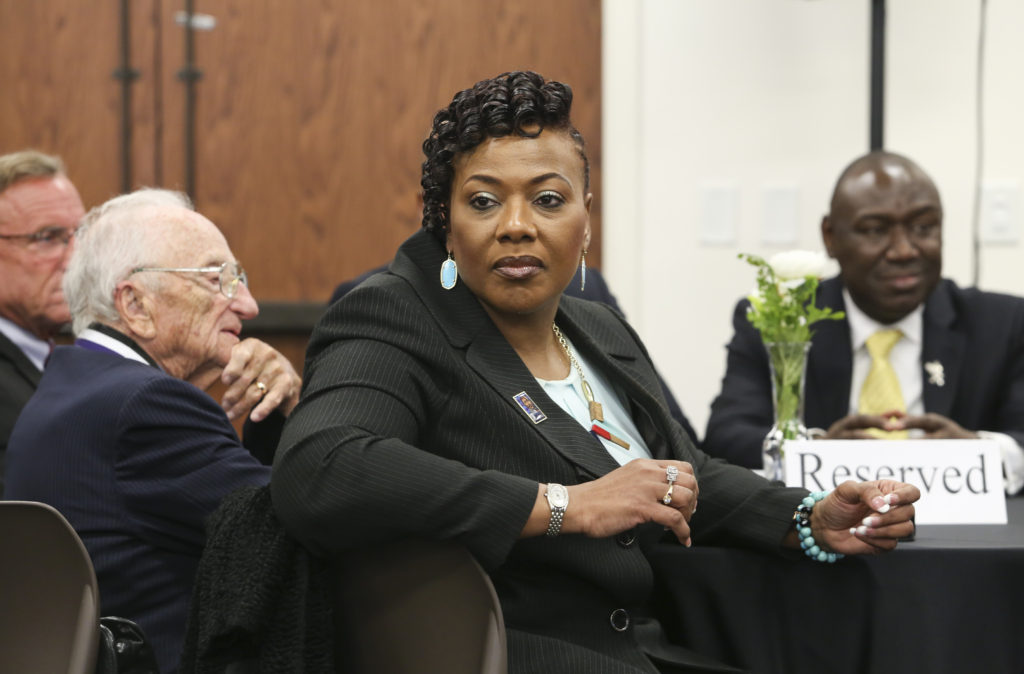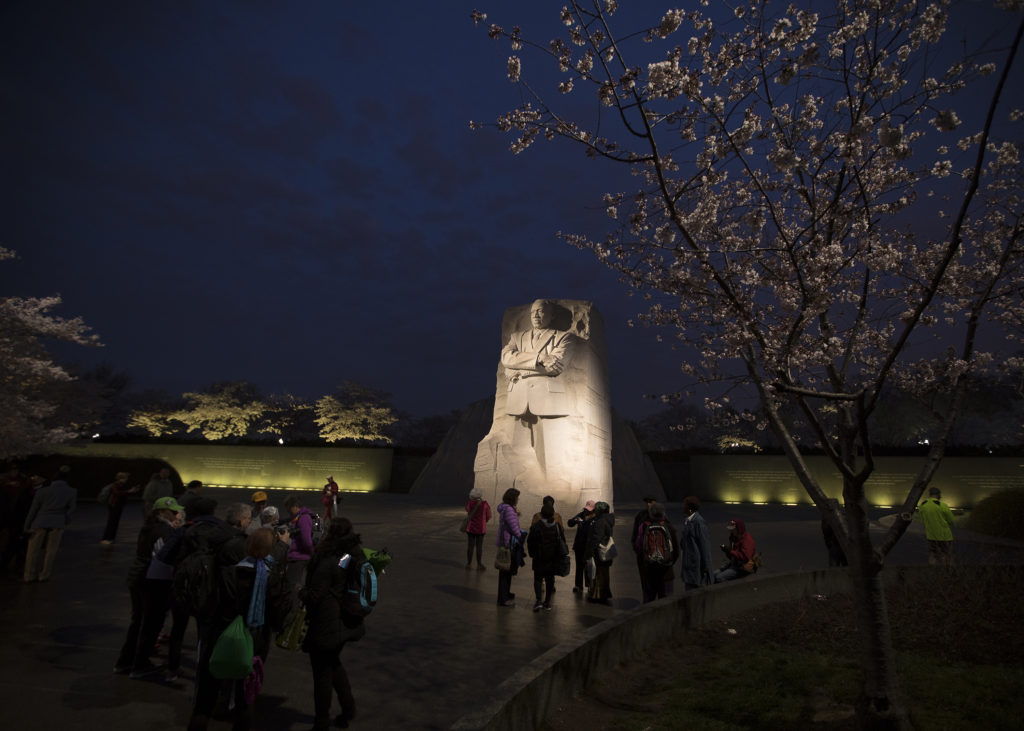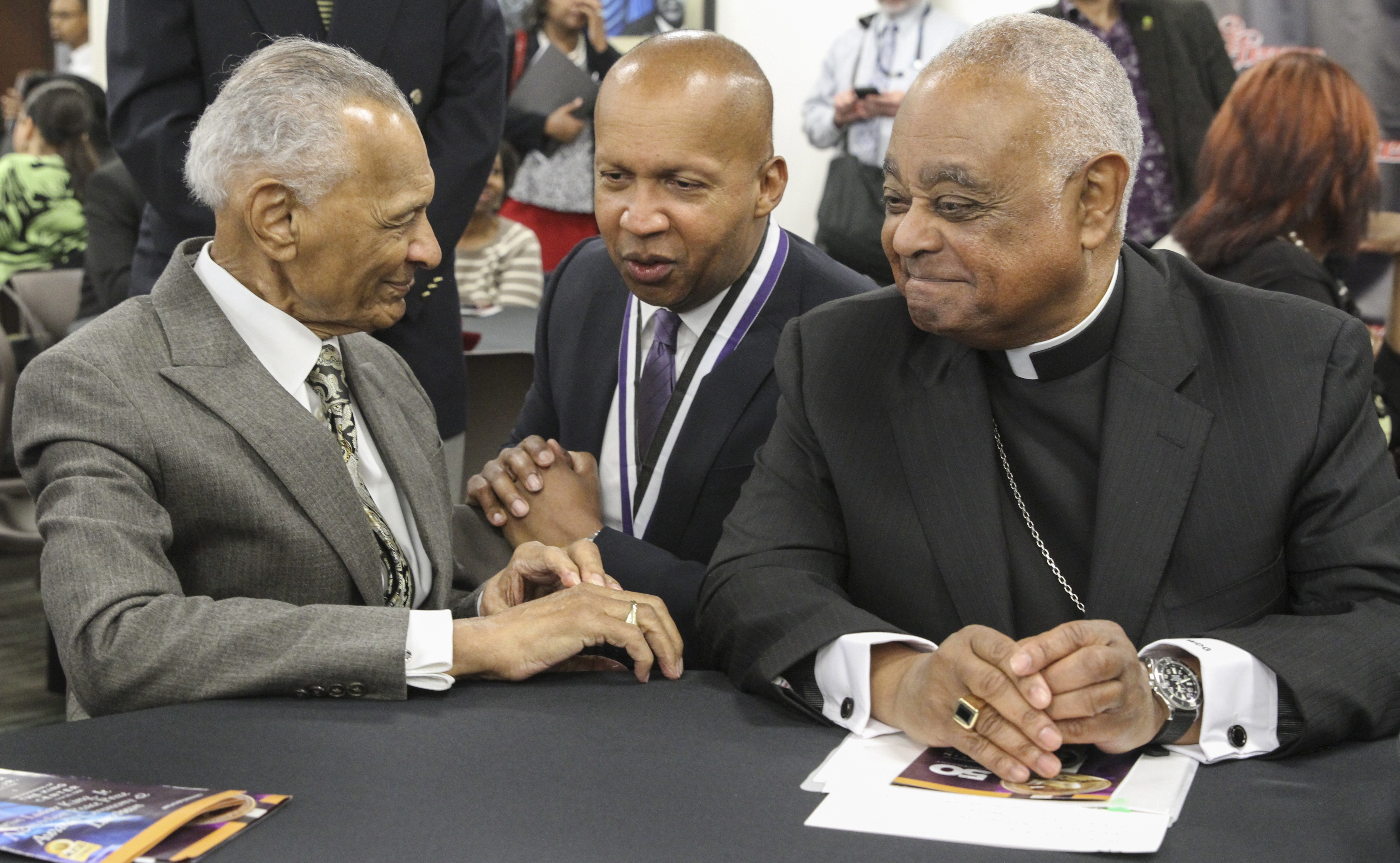ABOVE: Bryan Stevenson, center, a recipient of the 2018 Martin Luther King Jr. Nonviolent Peace Prize Award, shares a moment April 4 with the Rev. C.T. Vivian and Atlanta Archbishop Wilton D. Gregory. The 93-year-old Vivian was a close friend and ally of Rev. King during the civil rights movement. (Michael Alexander/CNS, via Georgia Bulletin)
By Andrew Nelson
Catholic News Service
ATLANTA (CNS) — Churches around the Archdiocese of Atlanta solemnly rang bells 39 times in commemoration of the 50th anniversary of the assassination of the Rev. Martin Luther King Jr.
From Atlanta’s Blessed Sacrament Church and the Shrine of Immaculate Conception to Flowery Branch’s Prince of Peace Church, the tolling bells marked Rev. King’s 39 years of age when he was fatally shot in Memphis, Tennessee, on April 4, 1968.
At Sts. Peter and Paul Church in Decatur, pastor Fr. Bryan Small and two dozen parishioners gathered for an evening observance, reciting prayers from the Church’s Liturgy of the Hours as well as psalms and other readings to memorialize martyrs.
Fr. Small said the moment was an opportunity for parishioners and members of a nearby Lutheran church to be together with their faith communities to “share in a legacy that for many has been a defining inspiration in their lives.”
The prayers helped people be aware the day was not merely a civic observation, but that the moment and the life of Rev. King had deeper significance, the priest told The Georgia Bulletin, Atlanta’s archdiocesan newspaper.
Earlier in the day, Archbishop Wilton D. Gregory of Atlanta joined with icons of the civil rights movement and other dignitaries at the Martin Luther King Jr. Center for Nonviolent Social Change in Atlanta to mark the anniversary.
The King Center, led by CEO Bernice King, the daughter of the slain leader, awarded the Martin Luther King Jr. Nonviolent Peace Prize, its highest recognition. The award recipients were attorney Benjamin Ferencz, an investigator and prosecutor of Nazi war crimes following World War II, and attorney Bryan Stevenson, author of “Just Mercy” and the founder and director of Equal Justice Initiative in Montgomery, Alabama.
Upon receiving the award, Stevenson shared a message he attributed to Rev. King: “We have to stay hopeful even in the face of these difficulties. Hopelessness is the enemy of justice.”
Rev. King taught the community to stand when others sit and to be a voice for justice when others remain quiet, he said.

Archbishop Gregory, who is the first African-American Catholic archbishop in the country, gave the invocation at the awards luncheon, held at Ebenezer Baptist Church, the home church of Rev. King, born in Atlanta Jan. 15, 1929.
The archbishop said he believes Rev. King would be asking more of the country. Rather than statues, roads and holidays named in his honor, the archbishop said the civil rights leader instead would want the country to be courageous and tackle the issues he embraced.
“He would be humbled by this recognition, but disappointed his true legacy has yet to be achieved,” said Archbishop Gregory.
The country wrestles with “blatant racial injustice,” and the resort to violence, as the disparity between the rich and the poor “continues unabated in a land as richly blessed as ours,” he said.
“What would he have us do?” asked the archbishop. “He would have us take up the tasks that remain unfinished.
“His prophetic voice would challenge us all,” he continued, “to work more vigorously to rid our nation of violence, to be actively engaged in the political arena that so needs purification, to follow the lead of our young people who call for and demand responsible gun control, and to recognize the countless thousands of homeless and hungry people still living in the shadow of our opulence even in this blessed Atlanta community.
“These actions would be the legacy he would most desire in 2018, 50 years after his assassination.”
Catholics attending the event recalled with clear memories where they were when news of the assassination spread.
The archbishop was a junior at his college seminary doing service at a school. When he and his classmates returned to their campus, he saw the fires from riots burning in Chicago some 40 miles away.
“It was just startling. I was just terribly disappointed. I remember thinking that did not have to happen,” he said.


Archbishop Gregory said he feared at the time that riots and looting in many cities would set the movement for civil rights back.
Monica Kaufman Pearson, the first African-American to anchor a daily evening newscast in Atlanta and an award-winning journalist, was a sophomore at the University of Louisville, Kentucky.
“Everyone was nervous. I remember the concern because riots broke out that night,” she said.
Pearson grew up in Louisville and attended St. Peter Claver Church and went to Presentation Academy, a girls school started by the Sisters of Charity of Nazareth, Kentucky.
She said her late mother made a point that has stayed with her: “If God could allow his son to die for our sins, so we could be saved, Dr. Martin Luther King died so that we could be free.”
“He was a martyr for the cause,” said Pearson, who worships at Our Lady of Lourdes Church across the street from the King Center.
For her, King’s message of peace and reconciliation remains powerful because it surprises people.
“Most people, when they are attacked, usually attack back. I really believe in turning the other cheek. … It disarms people,” said Pearson.
“You are doing the right thing and if you are harmed in some way during that process by people who don’t know Jesus, you need to pray for them,” she added. “And maybe their actions, they will learn, they will learn and feel the presence of the Holy Spirit that tells them, ‘What you are doing is not right.’”
Andrew Nelson is a staff reporter at THE GEORGIA BULLETIN, newspaper of the Archdiocese of Atlanta.






